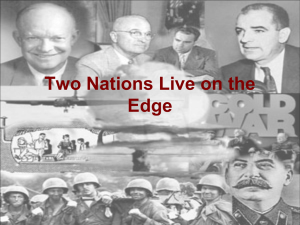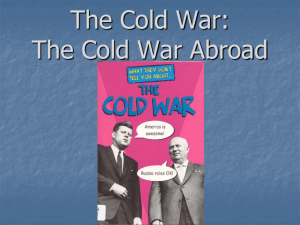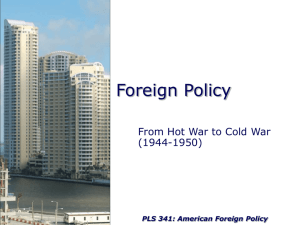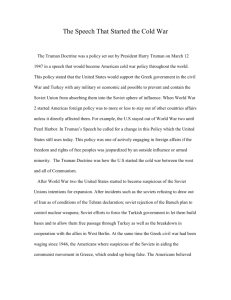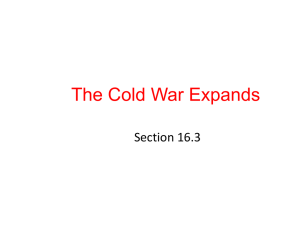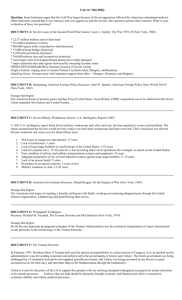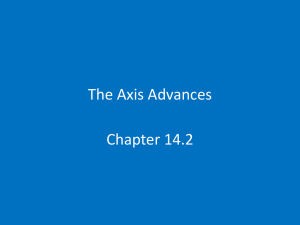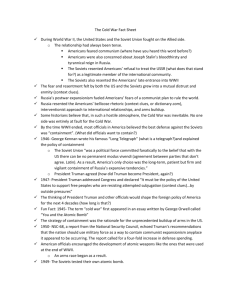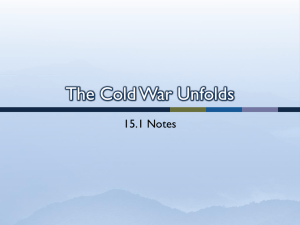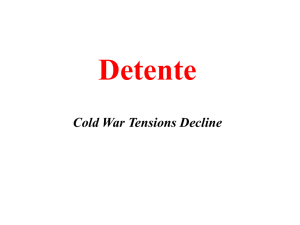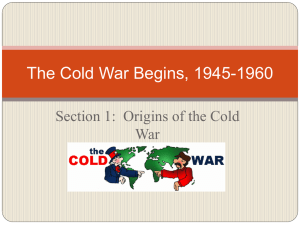21.2 Containment
advertisement
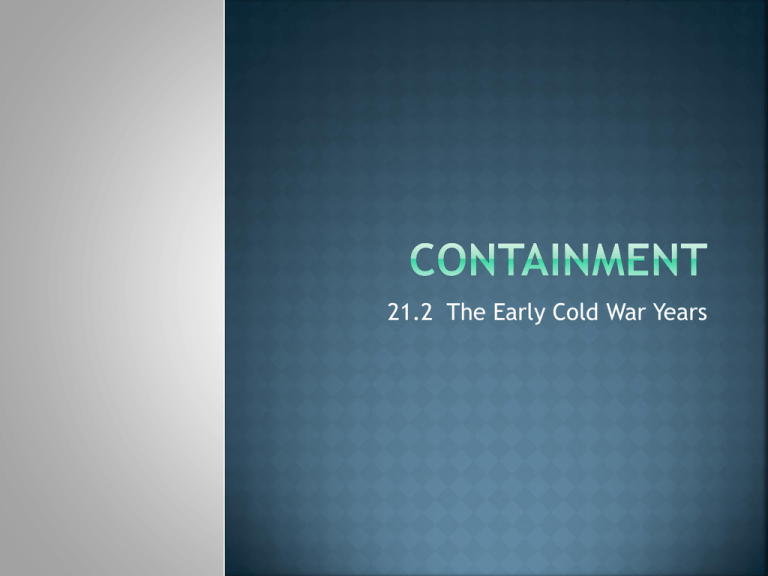
21.2 The Early Cold War Years 5,540 word cable message (that’s long!) explaining diplomat George Kennans’ views of the Soviet goals. Russian “insecurity” Fear of the West Historical struggle with capitalism. Goal should be to keep the Soviets from expanding. Containment: Keeping communism within its present territory through the use of diplomatic, economic, and military actions. Soviets occupied northern Iran U.S. had put troops in southern Iran. Soviets wanted a supply line from the Persian Gulf. Remained in northern Iran and then started demanding access to Iran’s oil supplies. Soviet troops helped local Communists establish a separate government Were the Soviets trying to push into the Middle East? U.S. battleship Missouri sailed into the eastern Mediterranean. Pressure seemed to work and the Soviet forces withdrew! Stalin turned to Turkey to control the Dardanelles (a vital route from the Black Sea to Mediterranean). Stalin demanded joint control of the Dardanelles with Turkey Presidential Advisor, Dean Acheson, saw this as a step to control the Middle East. Advised Truman to make a show of FORCE New aircraft carrier Franklin D. Roosevelt to join the Missouri in protecting Turkey and the eastern Mediterranean. U.S Turkey. Britain Greece. Greek Communists launched a guerrilla war against the British government. British fought for about 6 months but then could not longer afford to help Greece. In 1947 Truman went before Congress to ask for $400 million to fight Communist aggression in Greece and Turkey. “To aid free peoples who are resisting attempted subjugation by armed minorities or by outside pressures.” Effects: Stabilize the Greek government. Ease Soviet demands in Turkey Western European countries in serious financial crisis. George Marshall – U.S. Secretary of State. European Recovery Program, or Marshall Plan. American aid to rebuild their economies. Offered to all nations planning a recovery program. Soviets and countries in Eastern Europe rejected the offer. President Truman and his advisors believed that Western Europe’s recovery depended on Germany’s recovery. Soviets still wanted Germany to pay reparations to the Soviet Union. 1948 the U.S. Great Britain, and France announced that they were merging their zones in Germany and allowing the Germans to have their own government. They also planned to merge their zones in Berlin (which would become part of the new German republic). Federal Republic of Germany Was called West Germany. Soviet Zone became known as East Germany. By late 1948 the Soviets knew they were never get the reparations they wanted. Soviets cut off all road and rail traffic to West Berlin. Blockade U.S. sent long-range bombers with atomic weapons to bases in Great Britain. June 1948 – President Truman ordered the Berlin Airlift to begin. Lasted 11 months. Cargo planes supplied Berliners with food, medicine, and coal. Stalin finally lifted the blockade on May 12. Became a symbol of American determination to stand by the divided city. Military Alliance with Western Europe. 1949 North Atlantic Treaty Organization was formed – A mutual defense alliance. April U.S. Canada Britain France Italy Belgium Denmark Portugal Netherlands Norway Luxembourg Iceland Any member agreed to come to the aid of any member who was attacked. 6 years later the U.S. and its allies agreed to allow West Germany to rearm and join NATO. How do you the Soviets are going to respond to this? Soviets organized a military alliance in Eastern Europe which became known as the Warsaw Pact.
